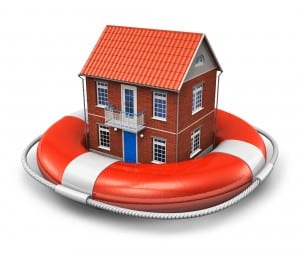Rental Property Insurance: Why Landlords Need Special Protection
There are many reasons to rent your home instead selling when it’s time to move. Some may want to build up equity in the home by having someone else pay the mortgage. Others may want a backup property just in case something unexpected where to happen to their primary property. Or you may have to move suddenly due to a job or other circumstance and the only viable option may be to rent the property. 
In such cases (commonly referred to as “accidental landlords”), homeowners are often not prepared for all that goes into renting their home. For example, many believe that their standard homeowner policy will provide sufficient coverage while the property is rented. It is true that homeowner and rental property insurance have several similarities, but there are some differences as well.
Homeowner’s Insurance
Homeowner policies can vary depending on the insurer and coverage options selected. However, there are some basics that are included in every policy:
- Dwelling (Part A): This coverage insures the home for covered events such as fire, hail, windstorms and lightning.
- Other Structures (Part B): Insures other structures on the property (such as detached garages or out buildings) for the same covered events.
- Personal Property (Part C): Insures against theft or damage to the items inside the home. With most policies, the total coverage for personal property is between 50% and 75% of the dwelling coverage.
- Living Expenses (Part D): Pays for expenses such as hotel and food in the event that the property owners are displaced by a covered disaster and repairs are needed.
- Liability: Insures homeowners in the event that another party sues them after being injured on the property (or other covered circumstance) up to the policy limits.
Rental Property Insurance
Homeowner’s insurance is designed to protect the homeowner while living on his/her own property. Rental property insurance includes the same coverages as a homeowner policy, but there is additional protection specific to having a tenant renting your property. For example, this policy offers additional liability insurance in the event that the renter or one of their guests suffers an injury on the premises.
Another coverage specific to a landlord’s policy is loss of rental income. For example, if your tenants cause severe damage to the property, your policy will compensate you for the rental income lost while the home was being repaired and the tenants were displaced. Maintaining this income can be vital to being able to keep up the mortgage payment.
The annual premium for rental property insurance is typically higher than a standard homeowner policy, but it is well worth it to have the necessary coverage you need while your home is rented. In addition, your local municipality may require that you carry a landlord policy in order to comply with their regulations.
If you are renting your home (by accident or otherwise) and still have a regular homeowner policy, speak with a local rental insurance agent about rental property insurance options. It is best to talk with an independent insurance agent with access to several top carriers in your state. An independent agent can shop for you among a number of insurers to find the landlord policy that best fits your needs.




